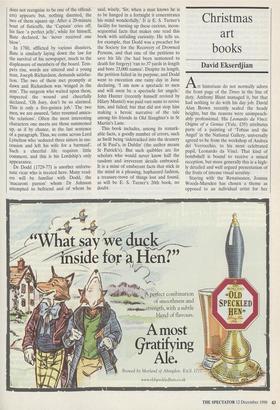Making the angels weep
David Nokes
UNHOLY PURSUITS: THE WAYWARD PARSONS OF GRUB STREET by E. S. Turner The Book Guild, £15.95, pp. 224 E. S. Turner likes to be known by these initials, though in this age of instant infor- mality they strike one as rather quaint. They seem to recall the likes of T. S. Eliot and H. G. Wells and roll-calls of boys in sepia-tinted photographs peering out from a dusty cricket pavilion. The Richmond and Twickenham Times modestly expanded that `E' to 'Ernest' in a recent puff for this book, but in doing so committed a solecism that called forth a modest rebuke. 'The first-naming of all and sundry is the curse of the age,' commented E. S. Turner in a letter that went on to wonder if the propri- etor (Mr Dimbleby, no less) would care to be known as 'Dave'.
Manners may have altered, but nothing changes E. S. Turner who, in his 89th year, is publishing his 19th book. He has thereby beaten his publisher who, after 18 books, decided enough was enough. Nothing daunted, Mr Turner has launched this book himself, with the wistful thought that the 18th-century poet Charles Churchill, when likewise forced to publish The Rosci- ad unaided, went on to clear £1,000 in only two months. Ah, those were the days! Dreams of wealth may not be within E. S. Turner's mind, but he has given it his best shot. The book is crammed with unholy incidents and spicy details of clerical life in the second half of the 18th century, written in a dry, matter-of-fact style, as if anxious not to be mistaken for making anything up.
His hero is the mettlesome figure of the Rev. Henry Bate, parson, journalist, dramatist, sportsman, rake and, incidental- ly, editor of the Morning Post. In 1773 Bate makes his first appearance, protecting the honour of a fine-looking woman, Mrs Hartley, from a group of impudent oglers in the sylvan shades of Vauxhall Gardens. He first asks them to desist, and when met only by taunts of 'soul-driver' and their threats to pull his nose, spit in his face etc, he challenges them to give him satisfaction at the Spread Eagle tavern. At the time appointed, one 'Captain Miles' (whom he does not recognise to be one of the offend- ers) appears; but, nothing daunted, the two of them square up. After a 20-minute bout of fisticuffs, the 'Captain' cries off, his face 'a perfect jelly', while for himself, Bate declared, he 'never received one blow'.
In 1780, afflicted by various disasters, Bate is similarly laying down the law for the survival of his newspaper, much to the displeasure of members of the board. Tem- pers rise, words are uttered and a young man, Joseph Richardson, demands satisfac- tion. The two of them met promptly at dawn and Richardson was 'winged in the arm'. The surgeon who waited upon them, inspected the wound and cheerfully declared, 'Oh Joey, don't be so alarmed. This is only a five-guinea job.' The two men, we are assured, 'later resumed amica- ble relations'. Often the most interesting characters one meets are those summoned up, as if by chance, in the last sentence of a paragraph. Thus, we come across Lord Lyttelton who 'seduced three sisters in suc- cession and left his wife for a barmaid'. Such a cheerful life requires little comment, and this is his Lordship's only appearance.
Dr Dodd (1729-77) is another unfortu- nate vicar who is treated here. Many read- ers will be familiar with Dodd, the `macaroni parson' whom Dr Johnson attempted to befriend and of whom he said, wisely, 'Sir, when a man knows he is to be hanged in a fortnight it concentrates his mind wonderfully.' It is E. S. Turner's facility for turning up these curious, incon- sequential facts that makes one read this book with unfailing curiosity. He tells us, for example, that Dodd was a preacher for the Society for the Recovery of Drowned Persons, and that one of the petitions to save his life (he had been sentenced to death for forgery) 'ran to 37 yards in length and bore 23,000 names'. Despite its length, the petition failed in its purpose, and Dodd went to execution one rainy day in June declaring, 'I am now a spectacle to men and will soon be a spectacle for angels.' John Hunter (recently himself revived by Hilary Mantel) was paid vast sums to revive him, and failed; but that did not stop him making a heroic narrative of the tale among his friends in Old Slaughter's in St Martin's Lane.
This book includes, among its remark- able facts, a goodly number of errors, such as Swift being 'sidetracked into the deanery of St Paul's, in Dublin' (the author means St Patrick's). But such quibbles are for scholars who would never know half the random and irreverent details embraced. It is a mine of exuberant facts that stick in the mind in a pleasing, haphazard fashion, a treasure-trove of things lost and found, as will be E. S. Turner's 20th book, no doubt.











































































 Previous page
Previous page